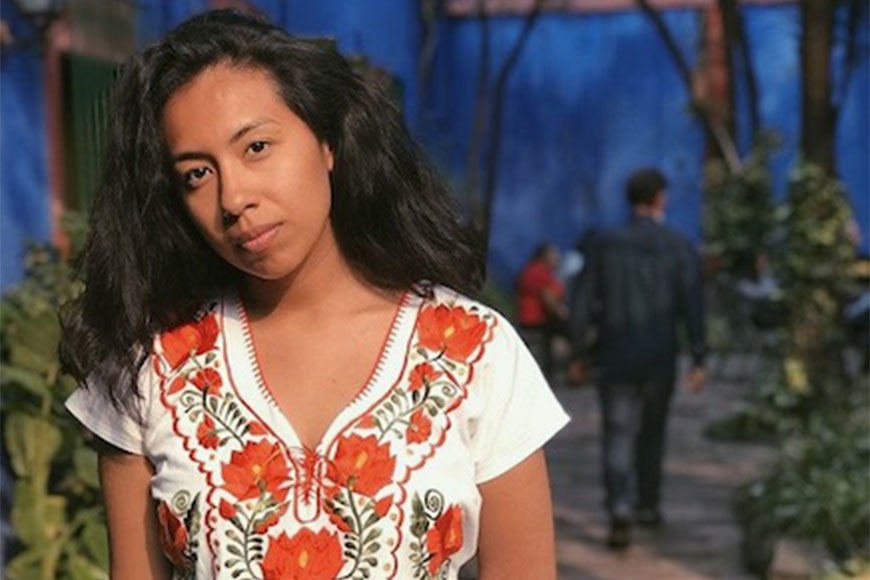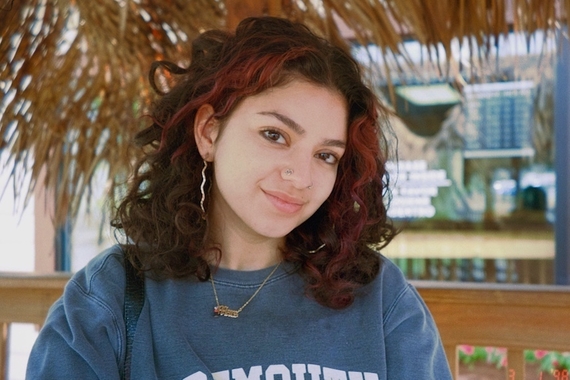Erika Hernandez: Doing the Work That Matters
Note on the terminology: I have chosen to use Latine and Chicane with the letter “e” in replacement of “o”, “a”, or “x” as a gender-neutral or nonbinary alternative to Latino/a/x. It is a term that acknowledges the contributions and existence of all peoples. “Latine” also aims to go beyond the US experience and is more linguistically accessible to Spanish speakers, which is my target audience.
What do you consider home?
I come from campesinas with trenzas and bullets across their pecho. I come from people whose identity was forced to change overnight and whose home was stolen. I come from hidden figures who found their way to me. I come from abrazos y chocolate abuelita with pan dulce in a family gathering. Home is comunidad and familia; home to me is where my raíces are found, Puebla, Mexico, and to where its journey continues, Minneapolis, Minnesota.
What led you to pursue a major in Chicano & Latino studies at UMN?
I am a proud daughter of two immigrant parents who struggled to provide me with the tools I needed to be “successful” in a school system that was not built for us. Nevertheless, my parents never failed to provide shelter, food, or lessons “de la vida” and thus continue to be part of my motivation to pursue higher education.
I am driven to complete my bachelor's degree in this field because my identity and experience are power, and once mi gente act on that power, change is inevitable. My major has allowed me to deepen my understanding of my purpose, values, and gifts. As a scholar and member of the Latine community, my research and studies are intended to return and be centered in our community. From Latine contributions to this nation to rethinking history, and turning theory into practice, I am taking these lessons to our younger generations to plant seeds of advocacy and resilience. The work I do is very personal because there was a time when I normalized the inferiority that was ingrained in me. I teach the youths I work with about their history, systems of oppression, and to nourish imagination and always be proud of their raíces because I know the power that that has. I want more representation in the classrooms and other spaces of influence. I want to decolonize our Eurocentric educational system, and obtaining my degree in Chicano and Latino studies is one more step towards that process.
What work do you do at Centro Tyrone Guzman and why is it important to you?
Almost two years ago, I wanted to find a job that aligned with my values and gifts, and Centro became a place for me to live them out. Centro Tyrone Guzman is a nonprofit organization in south Minneapolis that works with and for the Latine community. Its existence was inspired by the El Movimiento in the 1960s that sparked poets, writers, and intellectuals to become a resource for our community at a time where there were not many of us here. I think of myself as someone who is driven to continue that legacy through our Raices youth program at Centro. Raices is the place that I would’ve liked to have had when I was struggling to find myself. It is a youth-led program that provides a safe space for Latine teens in a culturally sustaining environment.
This work is important to me because it’s my response to the State of Minnesota’s immense failing our Latine students. As a youth program coordinator, my goal is for our youth to feel and know the power they hold to create a world that they deserve and long for themselves and comunidad.
What work did you accomplish through UMN's Women and Girls of Color and Indigenous Women and Girls Initiative?
In 2018, I began to lead our Raices youth program, Jóvenes Latinas al Poder, which helps Latina youth exercise their leadership and collective power to advocate for justice, inclusion, and equity in the Twin Cities. Through this grant, our youth were able to craft, publish, and dedicate a book to our communities about their advocacy journeys. Activista! is a result of centering community, collaboration, and storytelling.
We often center governance and policy as the only way to bring change and devalue ordinary work, like art. Therefore, through artivism, the connection of art and activism, our youth took their words and art to redefine advocacy. This project is proof that extraordinary change can result from ordinary tools and people. One just needs to truly believe in the work they are doing, or, in the words of queer Chicana writer Gloria Anzaldúa, “do the work that matters, vale la pena.”
What are some upcoming projects with Jóvenes Latinas al Poder that you are excited about?
There is a lot in store for JLP this academic year; our first semester is focused on building community. From storytelling to social justice tours and restorative justice, we will be crafting spaces to honor our cultura y tradiciones to ground ourselves. Next year, we will focus on converting our knowledge into collaborative practice, such as partnering with our elders and other community leaders to educate our community on the importance of the 2020 census and elections.
Finally, our big project will be a youth-led campaign around Minneapolis Parks and Recreation Board’s Comprehensive Plan for Powderhorn Park. Our goal is to provide a platform to uplift their voices and gain community organizing tools to advocate for the issues they are passionate about.
What drives you? What would you like for people to know about your work?
There are many things that drive me, such as acknowledging that other worlds are indeed possible. I am inspired by the youth that I work with, comunidad, parents, abuelitos, and my personal upbringing. There are constant barriers to building power that many community organizers face. What I would like for other people to know is that we need all mechanisms and skills to bring change; it’s just not a question of ballots or marches. We need both of them, but also the arts, research, historians, our mothers, elders, youth, and more.
This work matters and we will not find liberation until we acknowledge that our liberation is bound together. All the issues that we continue to face today, such as climate change and reproductive rights, are interconnected; one cannot fight for a green new deal without centering the Brown and Black bodies that have been used as experiments and pushed to live in areas of high pollution. When those who benefit from whiteness are ready to prioritize their humanity over their whiteness and other unearned privileges, then we will be able to move to the next phase of our fight for justice and equity.
What was it like leading student organization, Raices Unidas (formerly known as Xicanos Latinos Unidos) at Minneapolis College?
Leading our Latine student organization at Minneapolis College was a beautiful, exhausting, and meaningful experience. In the beginning, I did not have the networks, skills, or vocabulary to do the work I ended up doing. What I did have was the desire to make change in my community, in other words, ganas. I was able to create meaningful relationships and work with a team who today I consider family. We held community events to celebrate our rich and diverse Latine cultural heritage, while also hosting educational events to provide tools to our younger generations to pursue higher education. The Latine presence was stronger than ever that year, then came the launching of LUCHA (Latinos Unidos in College for Higher Achievement), a physical space and program that would ensure to provide all resources needed to be a successful Latine college student. Being the president of Raices Unidas was the experience that sparked the organizer I am becoming. It was the first time that I put my love, drive, and passion into something in which I truly believed.
What goals do you have for your future?
My desire is to decolonize my body, mind, and never stop learning. I aim to create safe and brave spaces where our Latine youth can reach the stars and galaxies. To be unapologetic and reclaim our stories and space. I want to be in community to collectively heal and work toward building and achieving a sustainable and equitable world for all us. I aspire for our classrooms to be spaces where all of our students are celebrated and dignified. I want to become an ethnic studies teacher, but I also plan to be involved with public policy, think beyond the nonprofit industrial complex, and radically imagine alternative ways to bring systematic change. I want to write, read, make art, and a home of my own. I want to make my parents proud and be a representation of the sacrifices they have made for my sisters and me. I want to be happy and live a life where my core values embody my daily life.
This interview was conducted by an undergraduate student in CLAgency. Meet the team.


